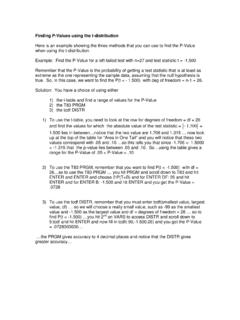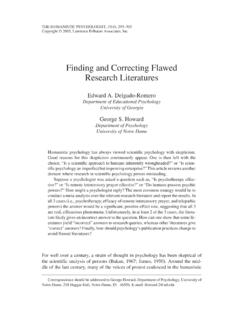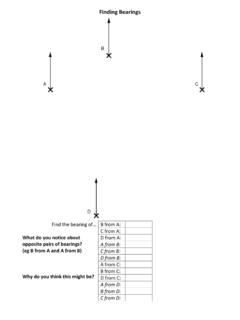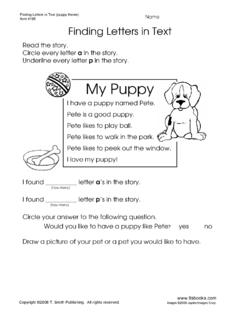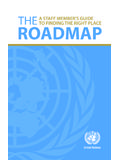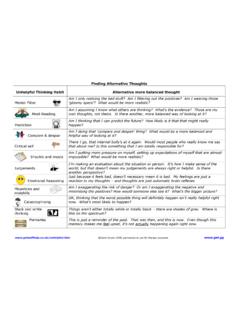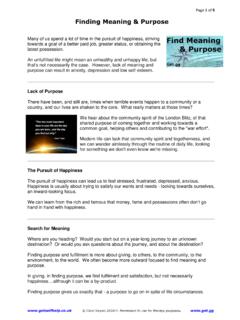Transcription of Psychology Today: Finding flow - IDUX
1 Psychology Today: Finding flow Back Send to Printer Finding flow Reviews the book ' Finding Flow,' by Mihaly Csikszentmihalyi. By:Mihaly Csikszentmihalyi We all are capable of reaching that stateof effortless concentration and enjoyment called "flow." Here, the man who literally wrote the book on flow presents his most lucid account yet of how to experience this blissful state. IMAGINE THAT YOU ARE SKIING DOWN A SLOPE and your full attention is focused on the movements of your body and your full attention is focused on the movements of your body, the position of the skis, the air whistling past your face, and the snow-shrouded trees running by. There is no room in your awareness for conflicts or contradictions; you know that a distracting thought or emotion might get you buried face down in the snow. The run is so perfect that you want it to last forever.
2 If skiing does not mean much to you, this complete immersion in an experience could occur while you are singing in a choir, dancing, playing bridge, or reading a good book. If you love your job, it could happen during a complicated surgical operation or a close business deal. It may occur in a social interaction, when talking with a good friend, or while playing with a baby. Moments such as these provide flashes of intense living against the dull background of everyday life. These exceptional moments are what I have called "flow" experiences. The metaphor of flow is one that many people have used to describe the sense of effortless action they feel in moments that stand out as the best in their lives. Athletes refer to it as "being in the zone," religious mystics as being in "ecstasy," artists and musicians as "aesthetic rapture.". It is the full involvement of flow, rather than happiness, that makes for excellence in life.
3 We can be happy experiencing the passive pleasure of a rested body, warm sunshine, or the contentment of a serene relationship, but this kind of happiness is dependent on favorable external circumstances. The happiness that follows flow is of our own making, and it leads to increasing complexity and growth in consciousness. WHERE TO FIND FLOW. Flow tends to occur when a person faces a clear set of goals that require appropriate responses. It is easy to enter flow in games such as chess, tennis, or poker, because they have goals and rules that make it possible for the player to act without questioning what should be done, and how. For the duration of the game the player lives in a self-contained universe 1 of 7 10/1/2007 4:55 PM. Psychology Today: Finding flow where everything is black and white. The same clarity of goals is present if you perform a religious ritual, play a musical piece, weave a rug, write a computer program, climb a mountain, or perform surgery.
4 In contrast to normal life, these "flow activities" allow a person to focus on goals that are clear and compatible, and provide immediate feedback. Flow also happens when a person's skills are fully involved in overcoming a challenge that is just about manageable, so it acts as a magnet for learning new skills and increasing challenges. If challenges are too low, one gets back to flow by increasing them. If challenges are too great, one can return to the flow state by learning new skills. How often do people experience flow? If you ask a sample of typical Americans, "Do you ever get involved in something so deeply that nothing else seems to matter and you lose track of time?" roughly one in five will say that this happens to them as much as several times a day, whereas about 15 percent will say that this never happens to them. These frequencies seem to he quite stable and universal.
5 For instance, in a recent survey of 6,469 Germans, the same question was answered in the following way: Often, 23 percent; Sometimes, 40 percent; Rarely, 25 percent; Never or Don't Know, 12 percent. A more precise way to study flow is the Experience Sampling Method, or ESM, which I developed at the University of Chicago in the early 1970s. This method provides a virtual filmstrip of a person's daily activities and experiences. At the signal of a pager or watch, which goes off at random times within each two-hour segment of the day, a person writes down in a booklet where she is, what she is doing, what she is thinking about, and whom she is with, then she rates her state of consciousness on various numerical scales. At our Chicago laboratory, we have collected over the years a total of 70,000 pages from about 2,300 respondents. Investigators in other parts of the world have more than tripled these figures.
6 The ESM has found that flow generally occurs when a person is doing his or her favorite activity--gardening, listening to music, bowling, cooking a good meal. It also occurs when driving, talking to friends, and surprisingly often at work. Very rarely do people report flow in passive leisure activities, such as watching television or relaxing. Almost any activity can produce flow provided the relevant elements are present, so it is possible to improve the quality of life by making sure that the conditions of flow are a constant part of everyday life. FLOW AT WORK. Although adults tend to be less happy than average while working, and their motivation is considerably below normal, ESM studies find more occasions of flow on the job than in free time. This Finding is not that surprising: Work is much more like a game than most other things we do during the day.
7 It usually has clear goals and rules of performance. It 2 of 7 10/1/2007 4:55 PM. Psychology Today: Finding flow provides feedback either in the form of knowing that one has finished a job well done, in terms of measurable sales or through an evaluation by one's supervisor. A job tends to encourage concentration and prevent distractions, and ideally, its difficulties match the worker's skills. Nevertheless, if we had the chance most of us would like to work less. One reason is the historical disrepute of work, which each of us learn as we grow up. Yet we can't blame family, society, or history if our work is meaningless, dull, or stressful. Admittedly, there are few options when we realize that our job is useless or actually harmful. Perhaps the only choice is to quit as quickly as possible, even at the cost of severe financial hardship. In terms of the bottom line of one's life, it is always better to do something one feels good about than something that may make us materially comfortable but emotionally miserable.
8 Such decisions are notoriously difficult and require great honesty with oneself. Short of making such a dramatic switch, there are many ways to make one's job produce flow. A supermarket clerk who pays genuine attention to customers, a physician concerned about the total well-being of patients, or a news reporter who considers truth at least as important as sensational interest when writing a story, can transform a routine job into one that makes a difference. Turning a dull jot into one that satisfies our need for novelty and achievement involves paying close attention to each step involved, and then asking: Is this step necessary? Can it be done better, faster, more efficiently? What additional steps could make my contribution more valuable? If, instead of spending a lot of effort trying to cut corners, one spent the same amount of attention trying to find ways to accomplish more on the job, one would enjoy working--more and probably be more successful.
9 When approached without too many cultural prejudices and with a determination to make it personally meaningful, even the most mundane job can produce flow. The same type of approach is needed for solving the problem of stress at work. First, establish priorities among the demands that crowd into consciousness. Successful people often make lists or flowcharts of all the things they have to do, and quickly decide which tasks they can delegate or forget, and which ones they have to tackle personally, and in what order. The next step is to match one's skills with whatever challenges have been identified. There will be tasks we feel incompetent to deal with. Can you learn the skills required in time? Can you get help? Can the task be transformed, or broken into simpler parts? Usually the answer to one of these questions will provide a solution;that transforms a potentially stressful situation into a flow experience.
10 FLOW AT PLAY. In comparison to work, people often lack a clear purpose when spending time at home with the family or alone. The popular assumption is that no skills are involved in enjoying free time, and that anybody can do it. Yet 3 of 7 10/1/2007 4:55 PM. Psychology Today: Finding flow the evidence suggests the opposite: Free time is more difficult to enjoy than work. Apparently, our nervous system has evolved to attend to external signals, but has not had time to adapt to long periods without obstacles and dangers. Unless one learns how to use this time effectively, having leisure at one's disposal does not improve the quality of life. Leisure time in our society is occupied by three major sorts of activities: media consumption, conversation, and active leisure--such as hobbies, making music, going to restaurants and movies, sports, and exercise.
